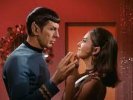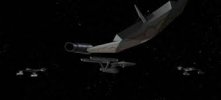Here's the end of the Romulan arc. This story can also act as a stand-alone because of its uniqueness.
October 21, 1968
Livia said that the Romulans weren't through just yet, and they had one more trick up their sleeve to unleash on our Enterprise heroes. In THE Y VIRUS, written by D.C. Fontana, the male members of the Enterprise crew, comprising 90% of the ship, are felled by a Romulan virus. Lieutenant Uhura takes command of the Enterprise, along with the remaining female crew unaffected by the virus, and takes on Livia in a final confrontation between the Federation and the Romulans.
Note: The female cast for the show must be written in before I proceed with the story.
Lieutenant Uhura: Nichelle Nichols
Nurse Christine Chapel: Majel Barrett
Lieutenant Marlena Moreau: Barbara Luna (science officer). Luna was working on Firecreek, a Western, in 1968, but she makes herself available for 10-14 days for this episode.
Lieutenant Palmer: Elizabeth Rogers (communications) She was a fill in for Uhura in The Doomsday Machine and The Way To Eden, so she is available IRL for casting.
Lieutenant Charlene Masters (operations): Janet MacLachlan. She was working on "The F.B.I." and had a role in a movie called "Uptight" IRL, so she only appears in two scenes for this episode, as her schedule is tight.
Barbara Baldavin: Lt. Angela Martine (tactical). She appeared in 3 Star Trek episodes IRL and was always on call for the show. In Balance of Terror, she mans the phaser banks.
Marianna Hill: Lt. Helen Noel (ship psychologist). She appeared in "Dagger of the Mind" IRL.
So onto the show...
On Gamma Hydra IV, a planet bordering the Romulan Neutral Zone, Sulu, Chekov and a group of male redshirts engage in a firefight with the Romulans. The Romulans kill three of the four redshirts, while Sulu and Chekov kill three Romulan soldiers. As the Romulans retreat, one of them throws what appears to be a smoke grenade at Sulu's landing party. Before they are able to escape, the grenade hits them on the ground close by and releases a mysterious gas. Sulu orders the landing party to retreat from the grenade, but they are caught by several whiffs of the smoke from the hissing grenade. Reporting that the Romulans are retreating, Sulu, Chekov and the surviving redshirt (Lt. Leslie, played by Eddie Paskey in his final Star Trek appearance), beam back aboard the Enterprise.
Kirk debriefs Sulu, Chekov and Leslie in the ready room as the Enterprise is in a standoff with a Romulan Bird of Prey above Gamma Hydra IV.
Kirk: "So we lost three men and were able to repel the Romulans on the planet."
Sulu: "Aye sir, we caused the Romulans to retreat."
Chekov: "They gave us a difficult fight with their disruptors and grenades, but we repelled their advance, Captain."
Leslie: "They threw grenades at us."
Sulu: "The grenades appeared to be smoke grenades. They were apparently trying to provide cover for their attacks."
Kirk: "No, the Romulans have some other motive for the grenades. That is not a normal part of their strategy in conducting ground attacks because they rely on overwhelming disruptor power."
Sulu: "I think they..."
Sulu collapses. Chekov immediately screams out but he collapses as he is attempting to help Sulu. Leslie also succumbs to the effects of the grenade.
Kirk: "Kirk to sickbay."
Bones: "McCoy here."
Kirk: "Emergency in the conference room, Bones. Sulu, Chekov and Leslie have collapsed."
Bones: "Bring them over to sickbay immediately. I'll examine them."
Kirk: "Kirk out."
Kirk, Spock, McCoy and Chapel are in sickbay, discussing what happened to Sulu, Chekov and Leslie.
Kirk: "The smoke from the grenades got to them. There must have been a poison in the grenade."
Bones: "Possibly, but it's unlike anything I've ever seen."
Spock: "It is unknown to Federation technology. I am curious as to what the Romulans used in their smoke grenade. I would like a sample of one of the patients' blood for analysis in the lab and spectroscopic samples of the grenade smoke."
Bones: "We're taking care of it, Spock. Chapel, draw blood from Sulu, Chekov and Leslie. I want to know what the Romulans did to them."
Chapel: "Taking care of it now, Doctor."
(Chapel draws blood from Sulu. As she finishes, Kirk collapses).
Chapel: "Captain!"
Spock: "He has collapsed, presumably for the same reason Sulu, Chekov and Leslie did."
Bones: "But why, Spock. Kirk wasn't part of the landing party. He wasn't exposed to the grenade smoke."
Spock: "Perhaps some of the grenade smoke contained a chemical that is finely transmissible by air, Doctor."
Bones: "You mean a virus, Spock?"
Spock: "Very likely, Doctor. The Romulans do not follow conventions of war in the same way the Federation does, Doctor McCoy. As we know, they are a ruthless enemy, predisposed to bloodthirstiness."
Bones: "They are monsters, conducting biological warfare against the Federation, Spock."
Spock: "Of that I am well aware, Doctor. We need those blood samples and cultures in order to create an antidote to a possible virus, Doctor."
Bones: "I'm on it, Spock. I'll have it ready within..."
(Bones collapses just like Kirk did).
Chapel: "Dr. McCoy! Spock, what is going on here?"
Spock: "You must acquire those blood samples immediately, before everyone on the ship is affected, Nurse Chapel."
Chapel: "I'll be on it, sir."
In the next scene, Chapel enlists the aid of Dr. M'Benga (Booker Bradshaw) for examining the blood samples. M'Benga collapses. Cut to the bridge, and all the male officers except for Spock immediately collapse. Uhura is in shock.
Uhura: "Sir, what in the world is happening to the crew?"
Spock: "Examining now, Lieutenant. Computer, bring up the disposition of every member of the crew on the Enterprise."
Computer: "Working, working. Out of 400 crew, 359 male officers and crew are unconscious or in sickbay. 40 female officers and crew remain conscious."
Spock: "Fascinating."
Uhura: "The virus only affects males? All the females are apparently unaffected, according to the computer."
Spock: "Apparently so. I am a Vulcan, so it is possible that I am either unaffected or less affected than the rest of the male crew. Spock to Chapel."
Chapel: "Chapel here."
Spock: "We need those blood samples and an antidote immediately. It appears as if the crew of the Enterprise is compromised and the Romulans will know before too long."
Chapel: "I have the virus culture, and it is bizarre indeed. The virus only affects the Y-chromosome, or the male of the species."
Spock: "Is there an antidote, Nurse Chapel."
Chapel: "It will take me some time to run one, sir. But I have bad news. The life signs of the crew members in sickbay are weakening, and at this pace, they will be dead in 24 hours."
Spock: "So you have that much time to devise an antidote, or the crew, or at least the male members of the crew of the Enterprise, will die. Spock out."
Spock: "Lieutenant Uhura, as the senior female officer aboard the Enterprise, you are my first officer. You will take the helmsman's role."
Uhura: "Sir, I haven't steered a ship since my Academy days. Sometimes I dabbled on the night shift, but I wasn't very good at it."
Spock: "That is understood, but there is nobody else on the ship to perform the role as well as you can. Organize the remaining members of the crew and meet me in the ready room. We must prepare..."
(Spock collapses)
Uhura screams in shock, but she comes to her senses quickly and says, "I'm in command."
Uhura convenes the senior female members of the crew in the ready room: Nurse Chapel, Lt. Marlena Moreau, Lt, Palmer, Lt. Charlene Masters, Lt. Angela Martine, and Lt. Helen Noel.
Uhura: Lt. Moreau, I will need you on the bridge at the science station that Mr. Spock normally occupies. Can you perform that role."
Moreau: "Yes, to the best of my ability. Nobody can replace Spock though."
Uhura: "You'll have to, at least until this crisis is over. Chapel, continue to find the antidote to the virus. Return to sickbay at once."
Chapel: "Yes, Uhura." (returns to sickbay).
Uhura: "Lt. Palmer, you will sit at my normal station at communications. I know you can do a great job there."
Palmer: "Aye, Lieutenant. Consider it done."
Uhura: "Lt. Martine, I need you at tactical. You are experienced with the phaser banks."
Martine: "We've fought the Romulans before, and we can do it again, even with just the women on board."
Uhura: "Lt. Masters, I need you at the helm. You've steered the ship during the night shift when Sulu is off."
Masters: "Will do, Lieutenant."
Uhura: "Understood. Lt. Noel, I need a disposition of Romulan tactics. What will they try if they know our condition."
Noel: "They will attempt to board us. If they board us with the Enterprise in this state, we are no match for them and they will capture the ship."
Uhura: "Understood. Therefore, our first orders are to move us out of Romulan transporter range. We will set a course for Gamma Hydra III and see if the Romulans pursue."
All women: "Aye, ma'am."
Uhura: "Don't call me ma'am. I work for a living." (The women laugh). "Let's defeat these Romulans once and for all."
The Enterprise sets a course for Gamma Hydra III. The Romulans debate whether to pursue the Enterprise. Sub-Commander Tal argues that the Enterprise is attempting a ruse, but Commander Livia orders a pursuit. "We will mount Captain Kirk's head on the Praetor's wall on Romulus. Did our landing party deploy the virus?" Tal replies that they did. Livia wonders whether the Enterprise is retreating and in a weakened state. "We shall attack," says Livia.
On the Enterprise, the makeshift female crew is monitoring the Romulans. Lt. Moreau reports to Uhura that the Romulan ship is entering pursuit. Uhura says, "Red alert, battlestations. The Romulans think we're weak, but they are underestimating us again. Those shields must stay up, Masters. Under no circumstances can they board the ship."
Uhura: "Ship to ship."
Palmer: "You're patched in, Lieutenant."
Uhura: "This is Lieutenant Uhura, in acting command of the Enterprise. Do not mistake our retreat for weakness. If you engage in battle with us, we shall defeat you and drive you back into Romulan space."
Livia: "So our virus worked. The weak human females are in command. Lieutenant Uhura, we will board your vessel, and we will take the Enterprise back to Romulus as a prize of war."
Uhura: "You'll never beam through with our shields up."
Livia: "No worry, Lieutenant. We'll just destroy you and take the hull of the Enterprise back to Romulus."
Livia fires on the Enterprise. "Evasive actions," orders Uhura. The Enterprise takes a moderate hit from the Romulan torpedo. "Return fire," says Uhura. A space battle ensues and the Enterprise fatally damages the Romulan vessel with its phasers on full.
Chapel: "We have the antidote."
Uhura: "Start administering it to the crew. Patch me in to Romulan commander."
Palmer: "Frequencies open, Lieutenant."
Uhura: "Romulan commander, this is Lieutenant Uhura, Surrender or prepare to be boarded. We have found an antidote to your virus and you are adrift in space. Surrender or prepare to be boarded."
Livia: "I might die here, but the Romulan Empire shall never perish!" (Livia cries, and her last words are, "When sorrows come, they come not single spies, but in battalions.") The Romulan ship self destructs.
At the end of the show, Kirk and the full Enterprise crew are cured. Uhura and Chapel are promoted to Lieutenant Commander. Uhura teases Sulu, "I get to boss you around now." Sulu says, "I guess that's fair, you earned it by ending the war."
Nichelle Nichols:
We always wanted to do an episode where the female crew had to take over, but it was always put on hold because nobody could plausibly believe women could perform the same jobs as men. D.C. stepped into creative control and said, "we want to show off what the women could do," so The Y Virus was born. I still get loads of fan mail for my role in saving the Enterprise and Federation. As I recall, that episode got more fan mail than any of the others to date, and we were so surprised at how positive it was, especially from our female fans. I didn't fully realize at the time how my role would be considered heroic, both to women and the African-American community. I was asked by Roy Wilkins (NAACP CEO) to speak at the 1969 annual NAACP convention for my part in this episode. To this day, I think the episode both cemented our female and African-American fanbase, which were both wavering to that point.
D.C. Fontana:
Gene always thought that a woman-controlled episode was an interesting concept, but would go too far and stretch the bounds of believability. I told Gene that I was pretty good at writing, so if I can do that, why can't females perform in other roles, such as leading a starship? We already had Nichelle as a co-star, so why not make her the lead for a show? Justman approved. The challenge was getting the female cast together, because they were working on other roles. Janet MacLachlan was especially busy so it was a tight squeeze getting her into the shoot, but when we brought all of the women on the show, we relished in creating a real piece of television history.
John Lewis, civil rights activist and Congressman:
Unlike Dr. King, I was not a Star Trek fan, and neither were most of my friends. Even with Uhura on the show, Star Trek was a tenuous sell to the African-American community because she was always in a secondary role. When Uhura took command and led the ship as well as Captain Kirk ever did, I think the popularity of the show increased significantly in the African-American community. It was truly historic to not only see an African-American, but an African-American woman commanding the Enterprise and leading her to safety. Nichelle is always a hero in the community for that.
Robert Justman:
We feared that this episode would have a tremendous negative backlash, because women were not supposed to lead in this way during the 1960s, or so we thought. Instead, we received fan mail from little old ladies who marched in the suffrage movement in the 1910s, and middle-aged women who served in World War II in various capacities. They were definitely not our target audience for Star Trek, but they loved this episode and for most of the third season, our ratings were in the stratosphere, either winning our timeslot or finishing second to Gunsmoke. Star Trek had truly arrived.



